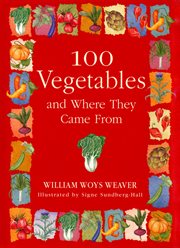Nonfiction
eBook
Details
PUBLISHED
Made available through hoopla
DESCRIPTION
1 online resource
ISBN/ISSN
LANGUAGE
NOTES
A perfect leek from France. Flavorful zucchini from Italy. An infamous potato from Ireland, and a humble lentil from Ethiopia. 100 Vegetables offers a veritable cornucopia of vegetables and stories from around the world--from Argentina to Zimbabwe, from Australia to the United States. William Woys Weaver--veggie connoisseur, gardener, and historian--guides us through a range of peppers, potatoes, peas, gourds, onions, tomatoes, greens, and a whole lot more. Not every carrot is the same. All beans aren't equal. Take the Petaluma Gold Rush bean, a rugged legume, grown for over 150 years and brought to California by an American whaler from Peru. Or the violet carrot, which the Greeks brought back from India following the conquests of Alexander the Great. Mixing history, culinary suggestions, practical information, and personal anecdotes, Weaver introduces us to unusual heirloom vegetables as well as to common favorites. He provides answers to general questions, such as the difference between a yam and a sweet potato, and presents lively portraits of one hundred vegetable varieties, which he's grown and harvested in his own kitchen garden. Organized alphabetically by common name, 100 Vegetables includes beautifully detailed drawings throughout and a helpful appendix of seed resources. William Woys Weaver is an organic gardener, food historian, and author of eight books--including Heirloom Vegetable Gardening and Pennsylvania Dutch Country Cooking, both of which received Julia Child awards for food reference. He and his kitchen garden have been the subject of articles in the New York Times, Country Home, the Chicago Tribune, and Food Arts. He lives in Devon, Pennsylvania, where he maintains an 1830s-style garden, featuring some three thousand varieties of heirloom vegetables, flowers, and herbs. Aji Dulce Pepper [Venezuela] Botanical name: Capsicum chinense Family: Solanaceae Aji is the South American word for pepper. Dulce means "sweet" but aji dulce (pronounced AH-hee DOOL-say) possesses two broader meanings, for it is both a variety and a type of pepper. On the one hand, aji dulce can be any one of a number of sweet peppers, and depending on the country where one lives the word may be used interchangeably with aji morrón, morrón, aji colorado dulce, and many other regional variations. This can make reading South American cookbooks a challenge, even for Spanish-speaking readers. However, in Venezuela, aji dulce means only one thing. It is a native variety of Capsicum chinense that is closely related to the so-called habaero peppers now scattered throughout the Caribbean, but sans the infamous heat. For those who are tired of hot pepper overkill and the sensation of fiery lava flowing through the body, aji dulce comes to the rescue. Best of all, it possesses that unique smoky flavor found in its hottest cousins. The history of this pepper is obscure, but since wild peppers are naturally hot this variety must have developed as a landrace over the years among farmers by simple selection of seed from milder and milder fruits. Landrace is a term commonly employed to describe noncommercial or "backyard" varieties that have been under cultivation for a very long time. They are the real ingredients of peasant cookery and often provide regional cookeries with their distinctive flavors. In Venezuela, aji dulce is now one of the cornerstones of the national cuisine, and seed is available from a number of firms here in the United States. The fruit of aji dulce can be used green or ripe, and it can be seeded and frozen for use over the winter, a technique that also preserves its rich flavor much better than drying. The Venezuelans commonly use aji dulce in preparing hallacas, a mixture of meat, peppers, raisins, almonds, capers, olives, and yellow cornmeal that is steamed or boiled in plantain leaves
Mode of access: World Wide Web







